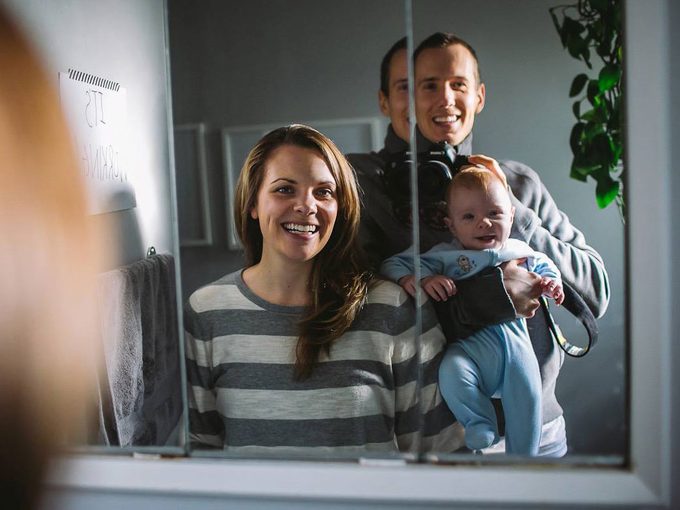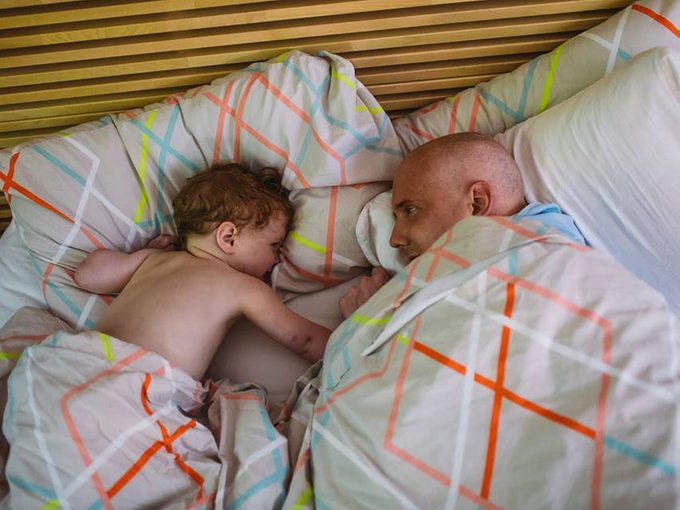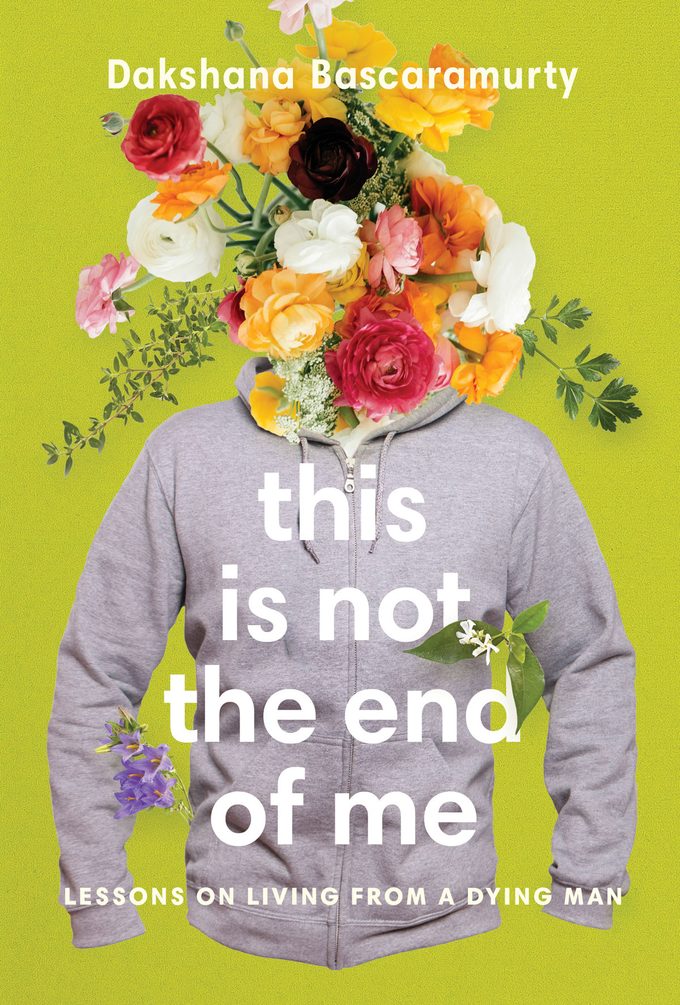Inside the Life of a New Dad, Who Knew He Was Dying
An excerpt from the revelatory new book, This Is Not The End Of Me: Lessons On Living From a Dying Man, by Toronto's Dakshana Bascaramurty.

Layton Reid was diagnosed with terminal cancer when he was 33, shortly after finding out he was going to be a father. The Halifax-based photographer invited Dakshana Bascaramurty, a Toronto journalist whose wedding he had shot months earlier, to document his fight for survival as a way to leave a legacy for his son, Finn. Her new book, This Is Not The End Of Me: Lessons On Living From A Dying Man, offers a clear-eyed view of a young father coming to grips with his mortality, and explores, with incredible empathy, the stories we choose to tell while we’re alive, and the ones we leave behind. In this excerpt, Bascaramurty pulls back the curtain on the multiple levels of caregiving and constant worry (by Layton, his wife Candance, his parents Willie and Phil, and his mother in law, Irma) that often goes unnoticed when the goal is simply to live another day.
The house was beginning to feel like a prison for Layton, and each day of this endless winter he could feel claustrophobia closing in on him. One day, he felt like getting outside was a matter of survival. He was the sort of person who preferred to spend almost all of his time on his own, but in that house where Gracie [the dog] was running around, competing for attention with Finn, who cried many times a day, where Candace and Willie were chattering, there was little calm to be had. Often when Layton felt stir-crazy and wanted to go for a walk, Candace would tell him he was too weak to venture outside and advise him to rest, and he usually obliged. This time felt different, though. His body wanted him to stay in bed, but his mind was desperate to be outside. Candace picked up on this.
“Just go,” she told him. She recognized the look on his face because she’d felt it many times herself.

She needed to take walks as often as possible to think in peace, even when the sidewalks still hadn’t been cleared by city crews. On one day when I was visiting after Christmas, she trekked through the snow-covered park with Gracie and Finn, who was attached to her chest in a baby carrier. He was facing outwards, but Candace could hear him fussing so she bent forward to see his face and noticed his hat had fallen over his eyes and he couldn’t see. As soon as she adjusted it, his screaming subsided. At least with this little man, the fixes were easy.
Later, while strapping him into his car seat, Candace noticed his hat had swivelled to the side again, obstructing his vision.
“Poor nugget, neglectful mother strikes again,” she cooed before readjusting the hat.
Of course, Layton saw her as anything but neglectful. He had taken to calling her Single Mom or Mother of the Year, while referring to himself as Deadbeat Dad. Candace laughed at the nicknames and sometimes was in on the jokes with Layton, but other times they felt uncomfortably on the nose. When her son screamed at night, Candace found it impossible to leave him alone. It was always anxiety-provoking for Layton to hear Finn wailing since he was too ill to help. “Oh, the baby’s crying,” he’d say, pointing out the obvious, or, “I think he needs to feed now.” As this continued long after Finn’s newborn days, Willie’s heart would break for Candace. She wanted to say, “Honey, you just need to let him cry” but held her tongue.
Sometimes, Candace would tell Layton she was taking the baby out on the road to calm him down. The tiny confines of the black Volkswagen Jetta became her sanctuary, and she’d often take a short drive and then pull over to cry, her sobs competing with Finn’s.

Her mother was her lifeline. And she’d use those aimless drives to call her, too, to vent about how tired she was, to confess she was afraid the treatment wasn’t working and her husband would soon be dead. Sometimes, Irma would simply listen, knowing her daughter just needed a sympathetic ear. Other times, she’d reassure Candace that if she could hold on for a few more days, she’d be able to take a bit of time off work to come down to visit and help out.
Finn had grown accustomed to being held and rocked in order to sleep, and when Irma visited she’d happily snatch him away from her daughter and agree to hold him for two hours uninterrupted so Candace could nap or be with Layton or, most often, clean the house in the face of everyone’s protestations. If Candace woke up in the middle of the night, Irma would be there for her to talk to.
Sometimes, when Candace would unload on her mother, Irma would respond with a well-meaning line like, “I feel so bad for you” or “I’m really worried about you.” On some days, these words were a salve, but on others, they’d hit a nerve and Candace would snap at her. “Gee mom, how can I make you feel better?” Irma learned to be more careful in her phrasing, eventually opting for daily texts asking, “how are you doing?” “you okay?” “how are things?”
Candace seized small moments of escape where she could. She yearned for those early days in Finn’s life, when he was easily transportable, when she could drive to her parents’ place in Prince Edward Island for a few days. The first time she went, Finn was only three months old. It was blissful: Finn was napping every hour and a half, she never had to postpone feeding him because she had to make a juice, and she could take long walks on the boardwalk every day without feeling tethered to the house. But soon the guilt would hit that Willie and Phil were taking care of Layton on their own and she’d reluctantly head home.
Pessimism would come in waves for Layton’s parents. Willie’s heart and head would have arguments. On days she thought he was doing well, she’d bake a tray of muffins for Candace. When he wasn’t, it would take all her resolve to plaster a smile on her face when she reported for duty at the house.
When Layton’s symptoms—fatigue, chest pain, stomach pain—seemed to worsen, Phil’s thoughts often jumped forward to what might happen after his son died. What would Candace do? he wondered. Would she remarry? Would she go back to being with her parents? Would Willie and I see Finn again?
Willie thought instead of the immediate consequences following her son’s death: how her mind and body would process it. Billions of people have died before and those people’s families have gotten through it. We’ll go to yoga. We’ll get drunk. We’ll survive.
Excerpted from This is Not the End of Me: Lessons on Living from a Dying Man by Dakshana Bascaramurty. Copyright © 2020 Dakshana Bascaramurty. Published by McClelland & Stewart®, a division of Penguin Random House Canada Limited. Reproduced by arrangement with the Publisher. All rights reserved.
Next: Three Surgeries in Under a Year: What it’s Like to Live With IBD




